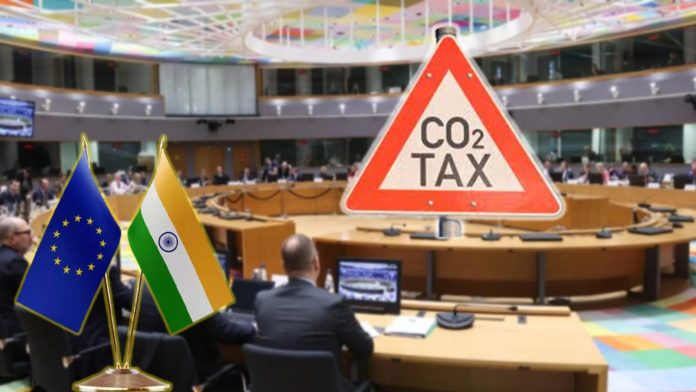Reports suggest that India is planning to engage with other countries to raise objections against the European Union’s Carbon Border Adjustment Mechanism (CBAM) at the World Trade Organization (WTO). The CBAM, which is a global carbon tax, is scheduled to take effect from October of this year. Officials have indicated that South Africa is also willing to join in challenging the concept of common but differentiated responsibility.
An official said, “CBAM is a major issue of consideration. We are exploring challenging it in the WTO with South Africa”.
What is CBAM exactly?
The Carbon Border Adjustment Mechanism (CBAM) is a policy that aims to tackle climate change by putting a price on the carbon emissions associated with imported goods. It’s like a tax or a permit that importers have to pay for the pollution caused when making those goods.
The idea behind the CBAM is to make sure that domestic industries aren’t disadvantaged by having to pay for carbon emissions while their foreign competitors don’t. It’s like creating a fair competition between countries.
By making importers pay for the carbon emissions in the goods they bring into a country, the CBAM encourages foreign producers to use cleaner technologies and reduce their pollution. The hope is that this will help fight climate change globally.
The European Union (EU) is leading the way in implementing a CBAM. They want to apply this carbon pricing to certain imported goods, starting with industries most affected by pollution.
The issue
Under the policy, EU is planning to introduce a new tax system that would require non-EU steel producers to report their emissions. This would result in a 20-35% tax on certain imports into the EU starting from January 1, 2026. Importers within the EU would have to declare and purchase certificates to cover the emissions associated with the production of imported steel products.
Some believe that the implementation of this tax, (CBAM), should be delayed until it’s clear whether it complies with the rules of the WTO. They think that the core principle of CBAM, known as “common but differentiated responsibility,” might be compromised.
In response, several countries, including India, are considering taking joint action at the WTO. They are concerned that the CBAM, along with the US Inflation Reduction Act and the EU’s law for deforestation-free products, could have trade-related implications rather than being solely about climate action.
India has engaged in discussions with the EU on this matter, expressing a different perspective on the principle of CBAM. They argue that carbon border measures are being selectively applied to industries like steel, aluminium, chemicals, plastics, polymers, and fertilizers, which reflects concerns about competitiveness in these sectors.
Countries on board
Taiwan, like South Africa, has expressed worry about the carbon tax. India has also gained the support of countries such as Brazil, China, and Thailand. This will aid in pressing the issue at the WTO ministerial session, which is scheduled for early next year.

